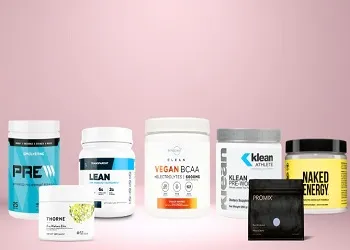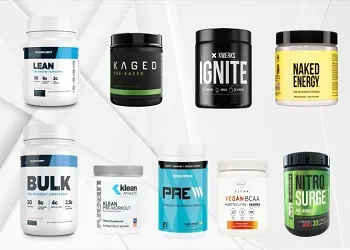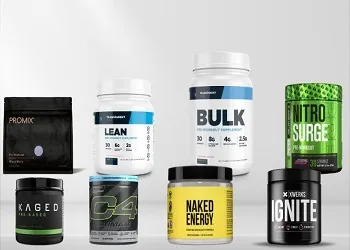You might have heard about creatine, especially if you’re into sports or working out. It’s a substance our bodies naturally have, mostly in our muscles.
However, many athletes and fitness pros take extra creatine to boost their performance. But does it actually give you more energy?
In this article, we’ll cover what creatine does, its benefits, any side effects, and if and how it gives you energy.
Table of Contents
What Does Creatine Do?
At its core, creatine is important for producing energy during high-intensity, short-duration exercises, such as weightlifting or sprinting. But how does it do this?
Produces Energy in Cells
Our muscle cells use a compound called adenosine triphosphate (ATP) as their primary energy source. When we exercise, that ATP breaks down to produce energy.
Creatine, which is naturally stored in our muscles as creatine phosphate, helps create more ATP to replenish our energy. This process enhances our muscles’ ability to perform high-intensity work.
Enhances Stored Energy
Naturally occurring creatine already helps to create stored energy. So, there are even more reserves in our muscles with supplemented creatine.
This increase in ATP leads to a quicker energy turnover, which means better performance during short, explosive workouts.
Increases Muscle Mass
Creatine has been shown to increase water content within our muscle cells, which leads to greater cell volume.
This function not only has the potential to make muscles appear more prominent but also supports muscle protein synthesis.
Promotes Brain Health
Your muscles aren’t the only thing that benefits from creatine. Some past studies demonstrate that creatine supplementation can enhance brain energy reserves and can even improve cognitive processes.
Does Creatine Give You Energy?
When people hear about creatine, the first thing many wonder is: “Will it give me more energy?” It’s a great question! Let’s break it down.
The quick answer: Yes. But not in the way you might think.
Muscle Energy
As I mentioned above, muscles use a type of energy called ATP. When we perform activities that require a quick burst of energy (e.g., sprinting, heavy lifting, throwing), ATP is used up. The more creatine you have available, the more efficiently your cells replenish ATP, allowing muscles to work harder and longer.
Creatine vs. Caffeine

Both creatine and caffeine are commonly taken before a workout to increase your energy, but they don’t work in the same way. Caffeine works through receptors in your brain, almost tricking your brain into thinking you have energy. It will make you feel more awake and alert.
Meanwhile, creatine works in your muscle cells, so you don’t feel that mental alertness. Instead, you’ll just be able to workout for longer without getting fatigued. You also skip out on any energy crashes.
Consistent Energy
As I mentioned above, creatine won’t give you a sudden jolt of energy or a big crash later. Instead, it’s more of a consistent energy boost for your muscles so that you can go for longer, lift heavier, and ultimately, build more muscle.
Ever wondered if there are other supplements that can help during workouts? Dive into our article about electrolytes and if they contain caffeine.
Benefits of Taking Creatine
In this day and age, it can be hard to tell which supplements are actually beneficial and which ones are just a trend or marketing scheme. Creatine supplements have some excellent research supporting them that shows there are some benefits to reap from them.
Enhances Performance During High-Intensity Exercise
Earlier, we talked about creatine’s role in ATP synthesis. High-intensity exercises demand rapid bursts of ATP, so the more creatine we have available, the more high-intensity training we can do.
Benefits Muscle Growth
Muscular hypertrophy, or increased muscle size, is a sought-after goal for many athletes and fitness enthusiasts. Creatine supplementation is associated with increased water content within muscle cells. This cellular hydration combines with enhanced energy production, which means more energy for your workouts. With more power comes better activities so that you can work towards more muscle building.
Supports Brain Function

Beyond physical performance, creatine also plays a crucial role in brain health. The brain, similar to muscles, requires significant amounts of energy, especially during cognitively demanding tasks.
Preliminary research indicates that creatine supplementation might enhance cognitive function, especially under conditions where energy demand is high, such as sleep deprivation or intense mental tasks.
May Support Healthy Blood Sugar Levels
Metabolic health is integral to overall well-being. Intriguingly, creatine has been shown to influence glucose metabolism. By aiding in transporting glucose to our muscles, creatine might play a role in maintaining healthy blood sugar levels, which is pivotal for metabolic health and disease prevention.
Are There Side Effects of Creatine?

Like all supplements, it’s good to know the potential side effects associated with creatine, even if it’s widely considered safe when taken in recommended doses.
Will Creatine Cause Weight Gain and Dehydration?
One of the immediate effects noticed by many creatine users is a slight weight gain. This increase is primarily due to water being pulled into the muscles, increasing water retention. While this might give the illusion of rapid muscle growth, it’s temporary and should not be confused with actual muscle tissue gain.
Furthermore, because of this increased water uptake by muscles, there’s a misconception that creatine can cause dehydration. In reality, studies have not found a direct link between creatine and dehydration or muscle cramps.
Nevertheless, it’s always a good practice to stay well-hydrated, especially when using supplements.
Will Creatine Cause Problems With My Kidneys, Blood Sugar, or Muscle Mass?
A pretty common concern is the potential impact of creatine on kidneys. Some speculate that prolonged creatine use might strain the kidneys due to the processing of the compound. However, most research suggests that creatine, when consumed within the recommended guidelines, does not harm the kidneys in healthy individuals.
Nevertheless, those with pre-existing kidney conditions should exercise caution and consult a healthcare professional.
Blood Sugar
Regarding blood sugar, there isn’t conclusive evidence to suggest that creatine dramatically affects glucose levels. Some studies indicate that it might aid glucose transportation, potentially benefiting blood sugar regulation.
Still, as individual reactions can vary, those with diabetes or blood sugar concerns should discuss creatine supplementation with a physician.
Muscle Mass
As previously stated, creatine is associated with some initial weight gain due to increased muscle water retention. This is often a temporary effect and not an actual increase in muscle tissue.
However, with sustained use and coupled with resistance training, creatine can indeed support muscle growth and strength.
Does Creatine Make You Hyper?
A common misconception surrounding creatine is its potential to induce hyperactivity or heightened alertness, much like caffeine or sugar. As previously mentioned, creatine doesn’t stimulate the nervous system in the same manner as stimulants like caffeine.
Therefore, consuming creatine won’t give you the jittery sensations or rapid heartbeat often associated with being “hyper”. It’s more about muscle energy than mental arousal.
That being said, like any supplement, individuals may have varied reactions, and I always recommend consulting with a healthcare professional before starting a new supplement regimen.
How Much Creatine Do I Need Per Day?

Now that you know the ins and outs of creatine, let’s talk about dosage. Keep in mind that everyone’s body is unique, so while there’s no one-size-fits-all answer, there are general guidelines backed by research.
How Much Creatine Does My Body Actually Need?
The human body naturally produces creatine, primarily in the liver, kidneys, and pancreas, and stores it in the muscles. On average, we make about 1 to 2 grams of creatine per day and obtain it from dietary sources, especially meats and fish.
So, for those looking to optimize athletic performance or muscle growth, additional supplementation may be beneficial.
Supplementation Phases
When starting with creatine, there are generally two phases:
Loading Phase
This phase is a short period, typically lasting 5-7 days, where higher doses are taken to quickly saturate the muscles with creatine. One might take 20 grams of creatine daily during this phase, spread out into four doses.
Maintenance Phase
After the loading phase, a reduced dose is recommended to maintain the creatine levels in the muscles. Daily doses during this phase range from 3 to 5 grams
Conclusion
Creatine, a naturally occurring compound in our bodies and a popular supplement, has garnered a lot of recent attention for its potential to enhance athletic performance, muscle growth, and even support brain function.
However, as with any supplement, understanding its proper use and potential side effects is essential. As always, before starting any new supplement regimen, you should consider consulting with a healthcare professional to ensure it aligns with your unique health and fitness goals. With proper guidance and use, creatine can be a helpful tool in your fitness journey.
FAQs
Does creatine energize you?
Creatine replenishes your body’s energy currency, called ATP, especially during short-term, high-intensity exercise. While it doesn’t enhance energy the same way caffeine does, it helps your muscles work longer and more efficiently.
How long does it take to get energy from creatine?
Creatine doesn’t provide intake energy. Instead, it builds up in your muscles over time with regular supplementation. Typically, after a loading phase of 5-7 days, users might notice enhanced performance in their high-intensity workouts.
Does creatine make you gain muscle?
Yes, while it does not directly grow muscle tissue, creatine indirectly supports muscle growth by enhancing performance during workouts.
What is the most common type of creatine supplement?
Creatine monohydrate is the most common and extensively researched form of creatine supplement available in the market.
References













